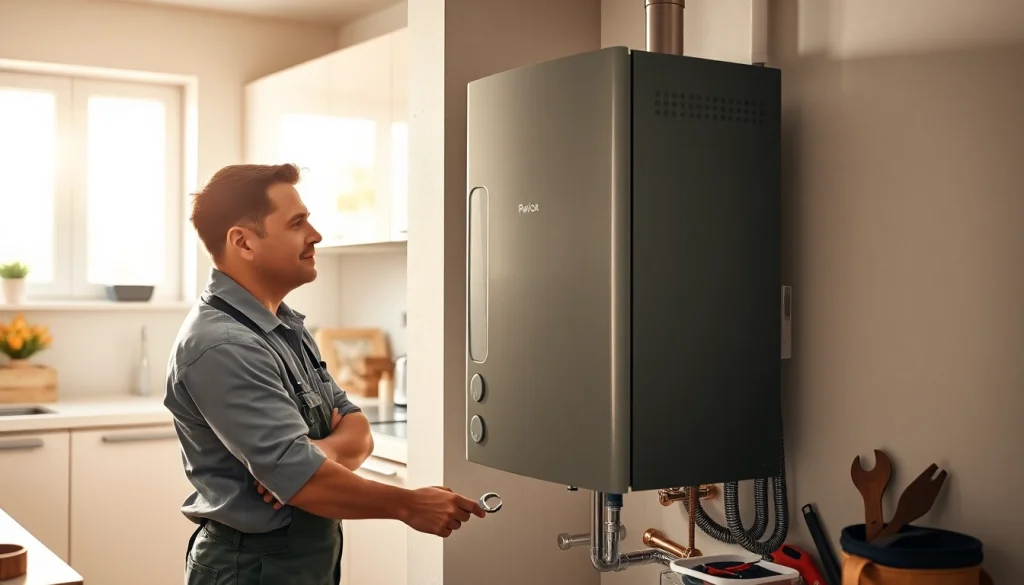Understanding the Role of a Boiler Installer Bristol
What Does a Boiler Installer Do?
A boiler installer plays a crucial role in ensuring that heating systems in residential and commercial properties function efficiently and safely. This professional is trained to install, maintain, and repair various types of boilers, which can include gas, oil, and electric systems. Their tasks encompass assessing a location for the best boiler type, handling the installation process, ensuring the system is compliant with local regulations, and conducting tests to guarantee proper operation once installed.
Additionally, a boiler installer may provide valuable advice on energy efficiency, suggesting systems that not only meet heating needs but also save costs over time. Those seeking a boiler installer bristol should look for professionals who offer these comprehensive services to ensure optimal performance of their heating systems.
Training and Certification Requirements
To become a qualified boiler installer, individuals generally need to undergo rigorous training and certification processes. This often includes completing a vocational course in plumbing or heating engineering, followed by hands-on training under the supervision of experienced professionals. Many boiler installers also pursue certification from recognized bodies, which can include City & Guilds or the Gas Safe Register for gas systems, ensuring they meet the required safety standards and regulations.
In the UK, gas safety is paramount, and being registered provides certification that the installer can work on gas appliances. Continuous professional development is essential as well, with many installers attending workshops and courses to stay updated on technological advancements and changes in legislation.
Importance of Hiring a Qualified Installer
Hiring a qualified boiler installer is vital for multiple reasons. First and foremost, it ensures the safety of the installation. Poor installation can lead to gas leaks, which pose severe risks to occupants. Furthermore, a qualified installer will understand local building codes and regulations, minimizing the risk of legal trouble or future complications.
Moreover, professional installers bring expertise that can significantly improve the boiler’s efficiency and longevity. An experienced technician will accurately assess the property’s requirements, install the appropriate system, and provide useful maintenance tips. Ultimately, this leads to fewer repairs, lower energy costs, and a properly functioning heating system.
Key Benefits of Professional Boiler Installation in Bristol
Enhanced Safety Standards
Safety is one of the most critical considerations when dealing with boilers. Professional installers adhere to stringent safety practices, which significantly reduce the likelihood of accidents. From proper venting of gas systems to ensuring all electrical components are installed correctly, professionals minimize risks associated with improper installations.
Moreover, licensed boiler installers keep abreast of the latest safety standards and regulations, ensuring compliance throughout the installation process. They conduct thorough checks and testing to confirm that the boiler operates safely before handing it over to the homeowner or business owner.
Improved Energy Efficiency
Ultimately, an expert boiler installer can contribute to improved energy efficiency, which directly impacts the cost of heating a property. By selecting the appropriate boiler size and type, a professional installer ensures that the system operates effectively, consuming only the necessary amount of fuel for the space being heated.
Additionally, modern boilers boast various efficiency ratings, and understanding which systems best fit particular needs is an area where professional insight is invaluable. An energy-efficient boiler not only lowers monthly energy bills but also reduces carbon footprints, contributing positively to environmental sustainability.
Access to Expert Advice and Support
When customers hire a professional boiler installer, they gain more than just technical skills; they also acquire access to a wealth of knowledge. Qualified installers can offer tailored advice specific to individual heating needs and the latest market developments. This may include recommendations on energy-efficient practices, the latest boiler technologies, and options for long-term maintenance plans.
Moreover, post-installation support is invaluable; a professional installer will usually provide guidance on how to use the heating system effectively, troubleshoot minor issues, and schedule regular maintenance checks. This ongoing support ensures that the boiler continues to function optimally throughout its lifespan.
Choosing the Right Boiler Installer Bristol for Your Needs
Factors to Consider During Your Search
Choosing the right boiler installer in Bristol is crucial for ensuring that the installation goes smoothly. Begin by identifying the specific type of boiler you need and whether the installer has experience with that particular system. Checking if they specialize in gas, oil, or electric boilers is also important, along with verification of their qualifications and certifications.
Another key factor to consider is availability. Some installers may offer next-day service, while others may require weeks for an appointment. Understanding how quickly you need the installation done can help narrow your search. Additionally, obtaining multiple quotes can provide insights into pricing structures and help you assess the market rates in your area.
Evaluating Customer Reviews and Ratings
Customer reviews and ratings can be incredibly insightful when selecting a boiler installer. Exploring platforms that showcase customer feedback allows for a comprehensive assessment of potential installers’ reputations. Look for feedback related to the quality of work, reliability, customer service, and overall satisfaction.
Be cautious of overwhelmingly positive reviews, as these may be from fictitious or incentivized sources. Instead, seek out a mix of experiences to form a well-rounded perspective. Aim for installers with predominantly positive reviews but also consider how they respond to criticism or negative feedback, as this can reveal their level of professionalism and commitment to customer satisfaction.
Checking for Licenses and Insurance
Before hiring an installer, it’s essential to check that they hold the necessary licenses and insurance to operate legally in your area. In the UK, this includes being Gas Safe registered for gas installations. Verifying these credentials not only protects the homeowner but also ensures that the installer adheres to safety standards and regulations.
Insurance is equally important, as it covers potential liabilities while the work is in progress. A reputable boiler installer will carry public liability insurance, which ensures that you are protected in the event of accidents or damages during installation. Always request proof of these credentials upfront to ensure peace of mind throughout the installation process.
Common Issues During Boiler Installation and How to Avoid Them
Miscommunication and Expectations
One of the most frequent issues during boiler installation stems from miscommunication between the homeowner and the installer regarding expectations. This can result in misunderstandings about the type of boiler being installed, the timeline of the project, and the overall costs involved. To avoid these pitfalls, clear communication is essential from the outset.
Prior to installation, ensure that all aspects, including the type of boiler, costs, installation dates, and any additional work needed, are discussed and documented. Encourage open dialogue with the installer to clarify any doubts or questions at every stage of the process.
Understanding Installation Costs
Boiler installation costs can vary significantly depending on numerous factors such as the type of boiler, whether any upgrades or additional plumbing is required, and the complexity of the installation location. It’s critical to have a comprehensive understanding of the total costs before commencing work.
Ask the installer for a detailed breakdown of all anticipated costs, including parts, labor, and potential extra fees. Having this clarity can prevent unpleasant surprises during payment and foster trust in your chosen installer.
Dealing with Old Equipment and Upgrades
When replacing an old boiler, there may be unexpected challenges. These could include outdated plumbing or electrical systems that require updating to accommodate a modern boiler. Additionally, the installation of a new high-efficiency boiler may require changes to venting or piping.
Before installation, it is wise to have a comprehensive assessment conducted to identify any necessary upgrades. Discuss these possibilities with your installer, and ensure that their quote includes any potential modifications or additional work needed to ensure a successful installation.
Maintenance Tips Post-Installation from Your Boiler Installer Bristol
Routine Check-ups and Servicing
Once your boiler is installed, ongoing maintenance is critical to its longevity and efficiency. Most manufacturers recommend annual servicing by a qualified professional to ensure that the system is operating safely and effectively.
Routine check-ups help identify potential issues before they escalate, and this proactive approach can save you money in the long run by preventing costly repairs or premature replacements. Schedule service appointments for thorough inspections, cleaning, and necessary adjustments.
Signs Your Boiler Needs Attention
Knowing when your boiler needs service is essential for maintaining optimal operation. Common signs that indicate your boiler may require attention include strange noises such as banging or clattering, an unusual increase in energy bills, or a drop in heating efficiency within your home.
Additonally, keep an eye out for warning lights on your boiler’s display, leaking water, or any noticeable changes in the quality of hot water being supplied. If you experience any of these signs, it’s advisable to consult your boiler installer immediately to assess and address the issue.
Best Practices for Boiler Efficiency
To maximize the efficiency of your boiler, consider implementing the following best practices: keep the area surrounding the boiler free from clutter, ensure vents and ductwork are not obstructed, and regularly bleed radiators to release trapped air. Setting the thermostat to an optimal temperature can also enhance efficiency while maintaining comfort.
Investing in smart thermostats can further improve control over heating and reduce energy consumption. Additionally, consider ongoing training or follow-up sessions with your installer to address any questions about modifications or improvements that may benefit your specific heating setup.





